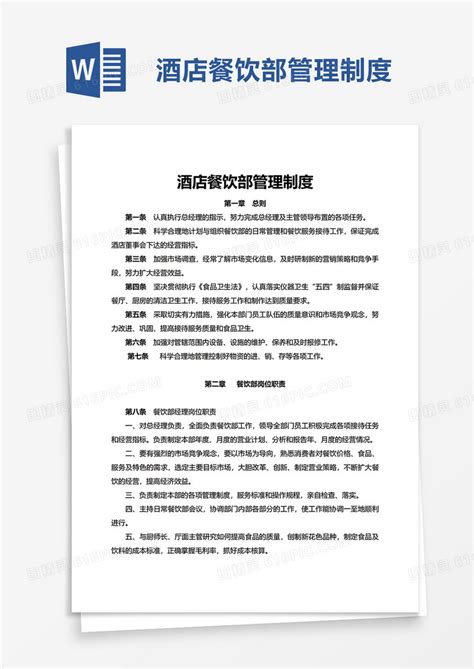As a hotel food and beverage (F&B) department supervisor, your role is crucial in ensuring the seamless operation and success of this integral aspect of the hospitality industry. Effective management strategies are essential for maintaining high standards of service, maximizing profitability, and enhancing guest satisfaction. In this guide, we'll delve into key areas of F&B department management and provide actionable insights to help you excel in your role.

One of the cornerstones of successful F&B department management is understanding and anticipating guest preferences. Conducting regular market research, collecting guest feedback, and analyzing industry trends can provide invaluable insights into evolving tastes and preferences. Utilize this information to tailor menus, develop innovative culinary offerings, and create memorable dining experiences that resonate with your target audience.
Crafting a wellcurated menu is essential for attracting guests and maximizing revenue. Consider factors such as seasonality, local ingredients, dietary preferences, and cultural influences when designing menus. Incorporating diverse options to cater to various tastes and dietary restrictions can enhance the appeal of your offerings.
Pricing strategies should be carefully calibrated to strike a balance between profitability and perceived value. Conduct cost analyses to determine appropriate pricing structures while remaining competitive within the market. Implement dynamic pricing techniques to capitalize on demand fluctuations and optimize revenue generation.
Investing in staff training and development is paramount for delivering exceptional F&B service. Provide comprehensive training programs covering menu knowledge, service standards, culinary techniques, and hospitality etiquette. Empower your team to exceed guest expectations through personalized service, attentiveness, and professionalism.
Encourage a culture of continuous learning and skill enhancement among your staff. Offer opportunities for crosstraining, certifications, and participation in industry events to foster growth and motivation. Recognize and reward outstanding performance to boost morale and cultivate a positive work environment.
Efficient operational management is essential for maximizing productivity and controlling costs within the F&B department. Implement standardized procedures, workflow optimizations, and technology solutions to streamline operations and minimize waste. Monitor inventory levels, track food costs, and implement inventory management systems to mitigate waste and reduce expenses.
Adopt energysaving measures, implement sustainable practices, and optimize resource utilization to minimize overhead costs and enhance environmental stewardship. Regularly review operational processes, identify inefficiencies, and implement corrective measures to improve overall efficiency and profitability.
Creating memorable guest experiences is central to fostering loyalty and driving repeat business. Personalize interactions, anticipate guest needs, and strive to exceed expectations at every touchpoint of the dining experience. Solicit feedback, respond promptly to inquiries or concerns, and resolve issues with empathy and professionalism.
Utilize data analytics and guest profiling techniques to segment your customer base and tailor experiences to their preferences. Implement loyalty programs, promotional offers, and experiential enhancements to incentivize repeat visits and cultivate brand loyalty among your guests.
Effective management of the hotel F&B department requires a holistic approach encompassing menu development, staff training, operational efficiency, and guest engagement. By implementing the strategies outlined in this guide and staying attuned to industry trends and guest preferences, you can elevate the dining experience, drive profitability, and position your establishment for longterm success in the competitive hospitality landscape.
版权声明:本文为 “眉山百科网” 原创文章,转载请附上原文出处链接及本声明;

